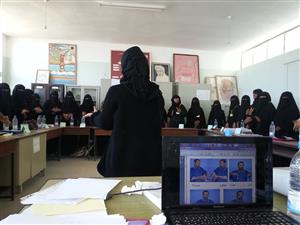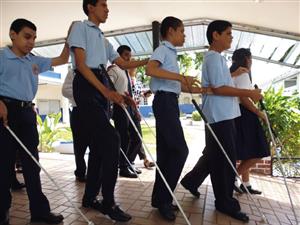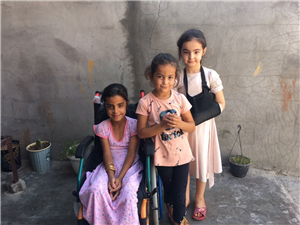Search Results
Search
Filter results
Advanced Filters
Your search returned 26 Solutions
-
GIS-based mapping and improving of accessible water, sanitation , and hygiene (WASH) facilities
ZWASH is conducting GIS-based mapping to assess the accessibility of toilet facilities in schools and health centres in Zambia. The data will be used by World Vision and government agencies to provide accessible toilets and WASH facilities where they are most needed. ZWASH will be rolled out in more than 40 other countries.
World Vision, Zambia Water Sanitation and Hygiene (ZWASH), Zambia -

Employment and inclusion of rural girls with hearing impairments
Women with hearing disabilities from rural areas receive training and education to ensure their participation in the job market. Informing families and communities about the needs and issues of these women leads to greater understanding and inclusion, which in turn helps to empower them economically and socially.
Al Saeeda Society for the Care and Rehabilitation of Deaf Girls in Yemen, Yemen -

Teaching students with disabilities to manage risks associated with natural disasters
RET Americas has developed inclusive learning methodologies to integrate disaster risk reduction and management (DRR&M) as a topic in public schools, introducing curricula and exercises specifically for students with disabilities. Since 2015, more than 4,000 young people with disabilities have taken part in the project.
RET International - Protection through Education, Inclusive school safety in Panama (disasters and natural hazards awareness), Panama -
Inclusive Education in post-war instability
The effective and creative use of resources has enabled a programme of inclusive education and early intervention to be rolled out in the Kurdistan region of Iraq. In 2007, the programme covered 42 schools, 62 teachers and 316 children. In 2010, there were 318 schools, 400 teachers and 2,051 children.
UNICEF - Iraq, Inclusive Education Programme of 2007 by the Ministry of Education, Iraqi-Kurdistan, Iraq, Iraq -
Creating mainstream schools in a war-torn country
The aim is to promote Inclusive Education at the community level with a focus on children with disabilities, girls and children of the Kuchi, a nomadic people.The programme provides services for 81,000 learners, of whom 65% are girls. The programme is also working with the government to develop an inclusive education strategy.
Swedish Committee for Afghanistan, Afghanistan -

Creating accessible water, sanitation, and hygiene (WASH) facilities for disadvantaged groups
WASH, an accessible water, sanitation and hygiene programme, has been implemented by World Vision in Iraq since 2016 with two local DPO partners. These identify needs, plan and manage construction and reconstruction work, and carry out information activities for the population.
World Vision, Accessible WASH for an Accessible Society, Iraq